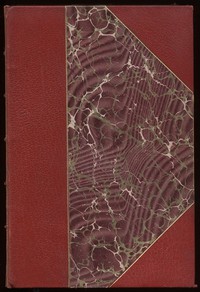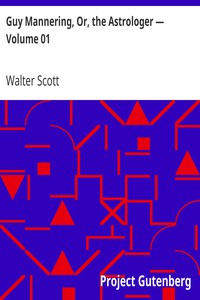Guy Mannering; or, The Astrologer — Complete by Walter Scott (good books to read in english .TXT) 📗

- Author: Walter Scott
Book online «Guy Mannering; or, The Astrologer — Complete by Walter Scott (good books to read in english .TXT) 📗». Author Walter Scott
‘And choose Jock Jabos for your master of horse?’ replied the lawyer.
‘Perhaps I may.’
‘And where is Dandie, the redoubted Lord of Liddesdale?’ demanded the advocate.
‘Returned to his mountains; but he has promised Julia to make a descent in summer, with the goodwife, as he calls her, and I don’t know how many children.’
‘O, the curly-headed varlets! I must come to play at Blind Harry and Hy Spy with them. But what is all this?’ added Pleydell, taking up the plans. ‘Tower in the centre to be an imitation of the Eagle Tower at Caernarvon--corps de logis--the devil! Wings--wings! Why, the house will take the estate of Ellangowan on its back and fly away with it!’
‘Why, then, we must ballast it with a few bags of sicca rupees,’ replied the Colonel.
‘Aha! sits the wind there? Then I suppose the young dog carries off my mistress Julia?’
‘Even so, Counsellor.’
‘These rascals, the post-nati, get the better of us of the old school at every turn,’ said Mr. Pleydell. ‘But she must convey and make over her interest in me to Lucy.’
‘To tell you the truth, I am afraid your flank will be turned there too,’ replied the Colonel.
‘Indeed?’
‘Here has been Sir Robert Hazlewood,’ said Mannering, ‘upon a visit to Bertram, thinking and deeming and opining--’
‘O Lord! pray spare me the worthy Baronet’s triads!’
‘Well, sir,’ continued Mannering, ‘to make short, he conceived that, as the property of Singleside lay like a wedge between two farms of his, and was four or five miles separated from Ellangowan, something like a sale or exchange or arrangement might take place, to the mutual convenience of both parties.’
‘Well, and Bertram--’
‘Why, Bertram replied, that he considered the original settlement of Mrs. Margaret Bertram as the arrangement most proper in the circumstances of the family, and that therefore the estate of Singleside was the property of his sister.’
‘The rascal!’ said Pleydell, wiping his spectacles. ‘He’ll steal my heart as well as my mistress. Et puis?’
‘And then Sir Robert retired, after many gracious speeches; but last week he again took the field in force, with his coach and six horses, his laced scarlet waistcoat, and best bob-wig--all very grand, as the good-boy books say.’
‘Ay! and what was his overture?’
‘Why, he talked with great form of an attachment on the part of Charles Hazlewood to Miss Bertram.’
‘Ay, ay; he respected the little god Cupid when he saw him perched on the Dun of Singleside. And is poor Lucy to keep house with that old fool and his wife, who is just the knight himself in petticoats?’
‘No; we parried that. Singleside House is to be repaired for the young people, and to be called hereafter Mount Hazlewood.’
‘And do you yourself, Colonel, propose to continue at Woodbourne?’
‘Only till we carry these plans into effect. See, here’s the plan of my bungalow, with all convenience for being separate and sulky when I please.’
‘And, being situated, as I see, next door to the old castle, you may repair Donagild’s tower for the nocturnal contemplation of the celestial bodies? Bravo, Colonel!’
‘No, no, my dear Counsellor! Here ends THE ASTROLOGER.’
THE END
NOTE 1, p. 25
The groaning malt mentioned in the text was the ale brewed for the purpose of being drunk after the lady or goodwife’s safe delivery. The ken-no has a more ancient source, and perhaps the custom may be derived from the secret rites of the Bona Dea. A large and rich cheese was made by the women of the family, with great affectation of secrecy, for the refreshment of the gossips who were to attend at the ‘canny’ minute. This was the ken-no, so called because its existence was secret (that is, presumed to be so) from all the males of the family, but especially from the husband and master. He was accordingly expected to conduct himself as if he knew of no such preparation, to act as if desirous to press the female guests to refreshments, and to seem surprised at their obstinate refusal. But the instant his back was turned the ken-no was produced; and after all had eaten their fill, with a proper accompaniment of the groaning malt, the remainder was divided among the gossips, each carrying a large portion home with the same affectation of great secrecy.
NOTE 2, p. 198
It is fitting to explain to the reader the locality described in chapter xxii. There is, or rather I should say there WAS, a little inn called Mumps’s Hall, that is, being interpreted, Beggar’s Hotel, near to Gilsland, which had not then attained its present fame as a Spa. It was a hedge alehouse, where the Border farmers of either country often stopped to refresh themselves and their nags, in their way to and from the fairs and trysts in Cumberland, and especially those who came from or went to Scotland, through a barren and lonely district, without either road or pathway, emphatically called the Waste of Bewcastle. At the period when the adventures described in the novel are supposed to have taken place, there were many instances of attacks by freebooters on those who travelled through this wild district, and Mumps’s Ha’ had a bad reputation for harbouring the banditti who committed such depredations.
An old and sturdy yeoman belonging to the Scottish side, by surname an Armstrong or Elliot, but well known by his soubriquet of Fighting Charlie of Liddesdale, and still remembered for the courage he displayed in the frequent frays which took place on the Border fifty or sixty years since, had the following adventure in the Waste, which suggested the idea of the scene in the text:--
Charlie had been at Stagshawbank Fair, had sold his sheep or cattle, or whatever he had brought to market, and was on his return to Liddesdale. There were then no country banks where cash could be deposited and bills received instead, which greatly encouraged robbery in that wild country, as the objects of plunder were usually fraught with gold. The robbers had spies in the fair, by means of whom they generally knew whose purse was best stocked, and who took a lonely and desolate road homeward,--those, in short, who were best worth robbing and likely to be most easily robbed.
All this Charlie knew full well; but he had a pair of excellent pistols and a dauntless heart. He stopped at Mumps’s Ha’, notwithstanding the evil character of





Comments (0)